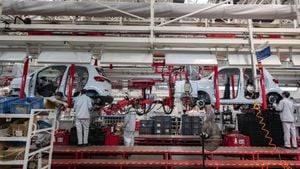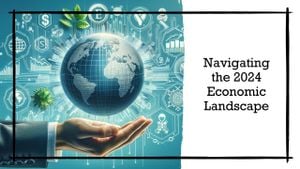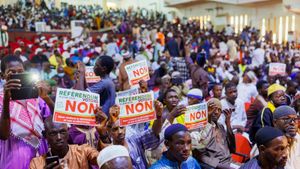With the 2024 U.S. presidential election heating up, the interplay between money and influence has never been more visible, particularly through the lens of billionaire backing. Wealthy individuals are stepping up, openly supporting their preferred candidates and, at times, creating rifts within the corporate elite.
Elon Musk, the world’s richest man, has thrown his weight behind former President Donald Trump. His commitment is evident through his financial contributions, with reports indicating Musk has donated roughly $119 million to Trump’s pro-campaign super PAC known as America PAC. Much of this funding is being funneled directly to boost Trump's election efforts, as he rallies support ahead of the upcoming election.
At recent campaign events, Musk declared, "I think this election is the most important election of our lifetime," highlighting his view on the high stakes involved. Notably, he is also engaging grassroots voters by promising to give away $1 million every day to those who register to vote across key battleground states.
On the opposing side, billionaire and Dallas Mavericks owner Mark Cuban has publicly endorsed Vice President Kamala Harris. Cuban is vocal about his belief in the Harris campaign, describing it as integral for the middle class and small businesses—an interest he believes isn’t adequately represented by Trump or his policies. “I think Kamala Harris is by far the best candidate. She’s great for Texas. She’s great for Americans,” Cuban remarked during his recent appearances.
Despite these endorsements from billionaires, there’s also seen hesitance among many wealthy Democratic backers. High-profile figures like Warren Buffett and Jamie Dimon have chosen to remain neutral this election season. Buffett, known for his previous endorsements of Barack Obama and Hillary Clinton, has stated he will not support any candidates this year, and Dimon, CEO of JPMorgan Chase, is reportedly unwilling to publicly endorse Harris, citing potentially adverse political repercussions.
The fears of retribution from among the billionaires reflect Trump’s surge and the unpredictability he brings to the political table. Trump’s previous presidency showcased his willingness to strike back at critics, which has made even vocal opponents hesitant about public endorsements or criticisms this time around. Dimon, who has privately indicated support for Harris, has publicly described the stakes as exceedingly high and dangerous, indicating how corporate leaders are grappling with the ramifications of Trump’s possible return.
Meanwhile, reports have emerged about Bill Gates contributing $50 million to the Harris campaign, yet like Buffett and Dimon, he is steering clear of any public endorsement, echoing the trend of caution among corporate bigwigs. It teeters on the line of political pandering, and skepticism runs high as they navigate the treacherous waters of aligning themselves with political factions.
Interestingly, Musk and Cuban, who frequently clash on social media over their views, don’t seem deterred by the tension between their differing political allegiances. They both utilize their vast resources to galvanize their respective supporters and influence the electorate. Musk, at one point, went as far as to highlight what he referred to as “fascist” tendencies within Trump's ideology. Cuban, responding to such sentiments, noted how important it is to maintain dialogue and not allow fear to dictate the political narrative.
The political clash doesn’t stop with these two either. The influence of billionaires extends far beyond mere financial support. With their platforms and wealth, they can shape public perception and discourse around significant political issues, making them pivotal players as the election nears.
Further complicate the billionaire influence dynamic are the recent actions of major publications. Notably, the Washington Post and the Los Angeles Times, both of which had recently positioned themselves against former-President Trump, have made startling editorial shifts. Jeff Bezos, owner of the Post, and Patrick Soon-Shiong of the Times stood accused of pulling endorsements for Harris in fear of retaliation from Trump if he regains office, raising eyebrows across the political spectrum about the integrity and independence of journalistic entities.
This discussion surges onward past just the campaign of 2024 but raises broader questions about the future of democracy and media's role within it. With societal divisions continuing to be accentuated through this election, the stakes rise higher every day as the influence of these billionaires and the energy from their campaigns shape the paths of both the candidates and their constituents.
Where some billionaires express enthusiasm and engage actively, like Musk and Cuban, others tread carefully, encapsulating the dynamics where wealth and fear intertwine. The mix of high-stakes fundraising alongside political endorsements fosters environment where fortunes can sway votes and incite significant shifts either way, but it’s unsure how sustainable this financial backing translates to actual voter turnout come election day.
Despite the apparent crossroads faced by the billionaire class, everyday voters might wonder how much their voices will resonate against the backdrop of such formidable financial clout. With Harris and Trump as the leading voices for their parties, these elections are not merely referendums on policies or personalities but also on the power dynamics at play between money, media, and every day citizens.
The outcome of the election could very well redefine how wealth and politics interact and potentially highlight any necessary changes the elite may need to confront within the political discourse arena fundamentally. The interwoven relationship between billionaires, political candidates, and media transparency now poses questions: how does democracy hold up when its foundations appear compromised by financial influence, and can voters sway outcomes effectively when the billionaire narrative looms large?



